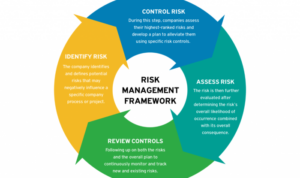Kicking off with Machine learning in business, this topic dives into how businesses leverage AI to make smarter decisions and predict future trends. From enhancing customer experiences to detecting fraud, machine learning is the name of the game in today’s business world.
Importance of Machine Learning in Business

Machine learning plays a crucial role in enhancing decision-making processes within businesses. By analyzing vast amounts of data, machine learning algorithms can identify patterns and trends that humans may overlook, leading to more informed and accurate decisions.
Industry Examples of Successful Machine Learning Implementation
- In the retail industry, companies like Amazon use machine learning algorithms to personalize product recommendations for customers, increasing sales and customer satisfaction.
- In the healthcare sector, machine learning is utilized to analyze patient data and predict potential health issues, leading to better treatment outcomes and improved patient care.
- In the financial services industry, machine learning algorithms are used to detect fraud and manage risks more effectively, safeguarding financial institutions and their customers.
Role of Machine Learning in Improving Customer Experience
Machine learning algorithms can analyze customer behavior and preferences to provide personalized recommendations, enhance product offerings, and streamline customer service processes. By leveraging machine learning, businesses can create a more tailored and satisfying experience for their customers, ultimately leading to increased loyalty and retention.
Applications of Machine Learning in Business
Machine learning plays a crucial role in various aspects of business operations, enabling companies to make data-driven decisions and enhance efficiency. Let’s explore some key applications of machine learning in business.
Predictive Analytics in Business Forecasting
Predictive analytics is a powerful application of machine learning in business forecasting, allowing companies to analyze historical data and make accurate predictions about future trends. By leveraging machine learning algorithms, businesses can identify patterns, trends, and anomalies in data to forecast sales, customer behavior, and market demand. This enables companies to optimize inventory management, pricing strategies, and resource allocation, leading to improved decision-making and operational efficiency.
Role of Machine Learning in Fraud Detection and Prevention, Machine learning in business
Machine learning is instrumental in fraud detection and prevention, helping businesses identify and mitigate fraudulent activities in real-time. By analyzing large volumes of data and detecting unusual patterns or anomalies, machine learning algorithms can flag potentially fraudulent transactions or activities. This enables businesses to take immediate action to prevent financial losses and protect their assets. For example, financial institutions use machine learning to detect credit card fraud, while e-commerce companies use it to identify fraudulent transactions and account takeovers.
Machine Learning in Marketing Strategies for Personalized Recommendations
Machine learning is widely used in marketing strategies to provide personalized recommendations to customers based on their preferences and behavior. By analyzing customer data, such as browsing history, purchase patterns, and demographic information, machine learning algorithms can generate tailored recommendations for products or services. This personalized approach not only enhances the customer experience but also increases customer engagement and conversion rates.
For instance, online retailers use machine learning to suggest products to customers based on their past purchases, leading to higher sales and customer satisfaction.
Challenges of Implementing Machine Learning in Business
Implementing machine learning in business comes with its own set of challenges that companies need to navigate. From biases in algorithms to data quality issues, here are some common hurdles businesses face when integrating machine learning into their operations.
Biases in Machine Learning Algorithms
Machine learning algorithms are only as good as the data they are trained on. Biases in the data used to train these algorithms can lead to biased outcomes, which can impact business decisions. It is crucial for businesses to be aware of these biases and take steps to mitigate them to ensure fair and accurate results.
Data Quality and Quantity
Another challenge in implementing machine learning in business is the availability of high-quality and sufficient data. Without enough data or with poor quality data, machine learning models may not be able to generate reliable insights or predictions. Businesses need to invest in data collection, cleaning, and management to ensure the success of their machine learning initiatives.
Future Trends of Machine Learning in Business
Machine learning is continuously evolving and shaping the future of businesses across various industries. As technology advances, new trends are emerging that are revolutionizing the way companies operate and make decisions.
Automation Impact on Industries
Automation through machine learning is expected to have a significant impact on industries such as manufacturing, finance, healthcare, and retail. By leveraging predictive analytics and data-driven insights, businesses can automate routine tasks, improve efficiency, and enhance decision-making processes. This trend is set to streamline operations and drive growth in diverse sectors.
Revolutionizing Supply Chain Management
Machine learning advancements are poised to revolutionize supply chain management by optimizing inventory management, demand forecasting, and logistics. With the ability to analyze vast amounts of data in real-time, businesses can improve supply chain efficiency, reduce costs, and enhance customer satisfaction. This trend is expected to reshape the way companies manage their supply chains, leading to increased competitiveness and agility in the market.






